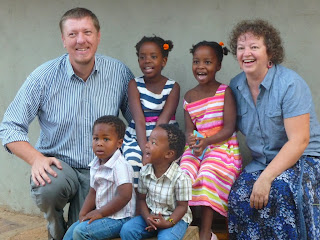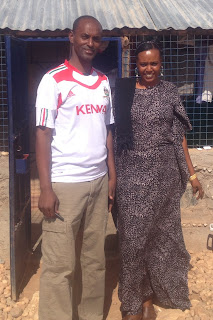I was sad to leave Korr and Kenya. I miss the big skies and sunrises/sets and greeting people as I walk about town. I am sad that I couldn't complete the Kenyan school year and see Form 4s to their national exams. But I am enjoying being back home.
I thought that I would stop posting on this blog once I returned to the UK. After all, I'm no longer 'Miss Jackson in Kenya' and life here doesn't seem quite as interesting as life in Korr.
However, a few friends have encouraged me to continue blogging. I suppose I can get round the title of the blog because a part of me is still in Kenya! And the adventure isn't over; the readjustment, I am sure, will be just as eventful as many times over the last year.
For example, I have to share with you the excitement that was one of my birthday presents from my brother (in case you haven't heard already). I got a signed photo from one of my favourite people: Julie Andrews! (Julie's sister-in-law works at Jonathan's school and he put in a special request. I am so chuffed!)
 |
| "For Hannah, with love from Julie Andrews" |
It is strange being back. In some ways it seems completely normal. So quickly I adjust to being back in my house, driving my car, going to the supermarket and putting out the bins.
Being back is also quite a novelty; discovering clothes and belongings I had forgotten, catching up with people I haven't seen in over a year, discovering changes in the city, enjoying the beautiful British countryside and appreciating modern conveniences, clean feet, ice cream and fresh fruit. I am even looking forward to the start of the new academic year; welcoming the new Year 7s, seeing old students and getting back into the school routine (not sure how long I will stay excited about that!)
I found a book devoted to the subject of returning from mission trips and I am led to believe that the next few months may be rather challenging as I go through what's called 'reverse culture shock' once the novelty wears off! And things are not the same here. There have been changes both at my school and my church. And I am not the same as I was.
Yet I am comforted by the fact that God does not change. Psalm 90 declares: Before the mountains were brought forth, or ever you had formed the earth and the world, from everlasting to everlasting you are God. And in James: Every good gift and every perfect gift is from above, coming down from the Father of lights with whom there is no variation or shadow due to change.
I change, people change and situations change, but God is a constant: great, good, loving, all powerful, forgiving, provider, holy, merciful, compassionate, gracious, patient, perfect, trustworthy.....(I could go on!)











































